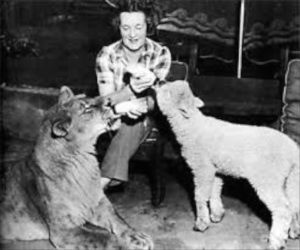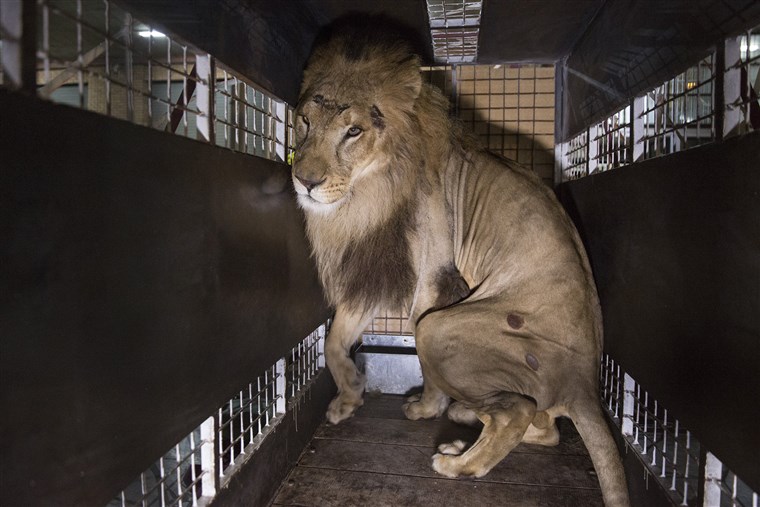In “How to Help When It Hurts?” my friend and colleague Cheryl Abbate considers an ethical conundrum often facing vegan activists, advocates, and rescuers who feel responsible for the well-being of Nonhuman Animals in adverse conditions with conflicting needs. In cases of genuine moral conflict, she suggests an application of the guardianship principle to assist with decisionmaking.
By way of an example, obligate carnivores like lions who are rescued from circuses and zoos deserve a chance to thrive in sanctuaries, but their ability to thrive is predicated upon harm inflicted against other animals who must be killed for their food. Rather than support systematic violence against cows, chickens, pigs, and other animals whose bodies are purchased as food for sanctuary inmates, Abbate suggests that sanctuaries, as guardians, might take up “hunting” (a euphemism for the killing of free-living animals).
There are a number of key flaws with this application of the guardianship principle. First, although Abbate frames a sanctuary’s decision to “hunt” as a case-by-case decision, that free-living animals (specifically deers) are considered a tappable resource indicates that their status is not much higher than that of traditionally farmed animals. Abbate counters that deers, unlike rescued carnivores and farmed animals, have a higher quality of life having lived free from human oppression. Their being slated for death suggests otherwise. Worse, they are being made to pay the dearest price for humanity’s moral wrongs. If humans are responsible for the injustice suffered by carnivorous refugees, why would human flesh not be offered in retribution?
Deer communities, incidentally, are regularly harmed by humans, too. Humans “manage” their populations, constrict their movements and migrations with boundaries and barriers, and terrorize them with automobiles and pollution. Although this life is pitted as superior given the relative freedom that deers experience, Abbate contradictorily banks on the difficulties of life in the wild (poor weather, hunger, disease, and overpopulation) as justification for sacrificing deers. This justification, however, brings up some troubling assumptions about right-to-life for ill or disabled bodies. It also harkens on a colonialist politic in assuming that demographics coded as inferior must be “managed” by “guardians.”
Obviously, solving moral conflicts such as these is no easy task, but complicating the issue is the tendency for advocates, philosophers, and consumers to constrain themselves to individual-level thinking. Sociology recognizes that oppression stems from a society’s economic mode of production. In this case, it is capitalism’s reliance on animal bodies that has created the oppressive behaviors and attitudes facing circus refugees, farmed animals, and free-living species. The problem, in other words, is much bigger than unethical or irresponsible individual choices. Only through a vegan restructuring of society will painful moral conflicts be eliminated. Whether or not sanctuaries rely on farmed animals as foodstuffs is beside the point; as long as human society is built on speciesism, farmed animals will continue to be killed en masse.
The assumption that consumers control the path of production is a misleading, if predominant, belief that has its roots in the nonprofit logic of the animal rights movement. It is actually industry and the state which control production such that sanctuaries turning to hunting are not likely to reduce the number of animals killed in slaughterhouses. Great quantities of animal products are now produced, and these quantities only increase by the year as markets deepen and expand. Consumer boycott has not been shown to be an effective means of reducing animal fatalities given state and industry control. Veganism’s political power lies in its ability to shift public consciousness and challenge the legitimacy of industries and the state, not in actually reducing the number of individuals killed in production. There must be cultural support for veganism and a political reconfiguring before the numbers begin to drop.

So how to manage the conflict in lieu of a vegan world? Given the limited capability of consumer boycott in a society in which consumers have very little control, using the bodies of farmed animals who are being killed at high volumes regardless of vegan protest may be an acceptable short-term solution. The vast quantity of edible animal products which go to waste might be repurposed for sanctuaries as well. Universities, for instance, often host food recovery programs to systematize the redistribution of leftover food to the needy. Sanctuaries might also develop such a program.
That said, efforts should be invested in obtaining (or even developing) healthful and tasty plant-based or at least partially-plant based menus for carnivorous refugees. Indeed, veterinary research supports that large cats (such as the hypothetical lion used in Abbate’s thought experiment) can survive healthfully on a vegan diet. There is also the famous case of Little Tyke, a lioness raised on a farm who refused to eat flesh. She lived the whole of her life on a plant-based diet by her own choosing.
Whatever the short-term solution, it is necessary that change-makers begin to conceptualize social problems as systemic. This will entail a move away from individualized solutions that wrongfully pit sanctuaries and consumers as responsible for violence against animals. Individualistic thinking renders invisible the state, industries, and the structures the two have created to normalize and reproduce speciesism.
My full response was published with the Animal Studies Journal and may be read here.

Readers can learn more about vegan economies and the politics of consumption in my 2016 publication, A Rational Approach to Animal Rights. Receive research updates straight to your inbox by subscribing to my newsletter

